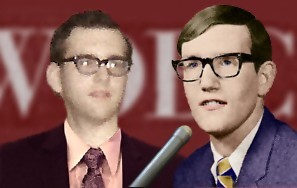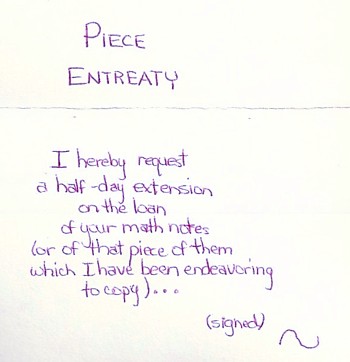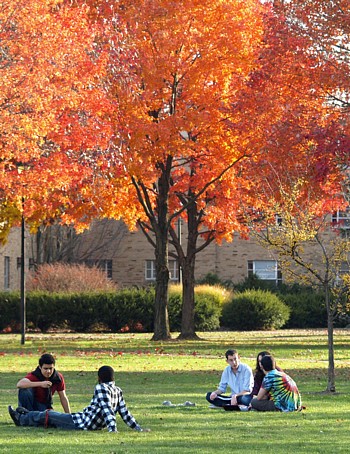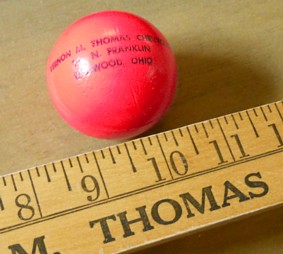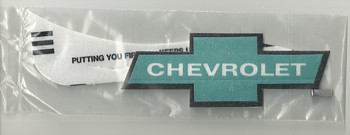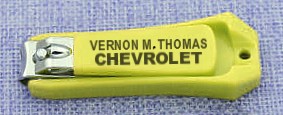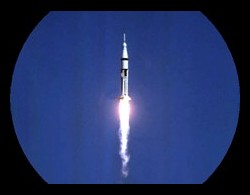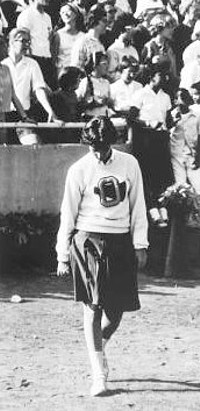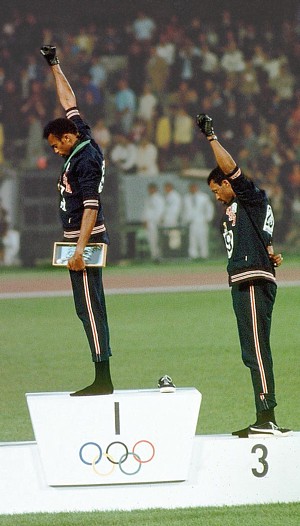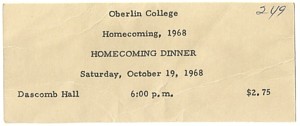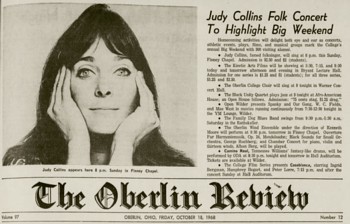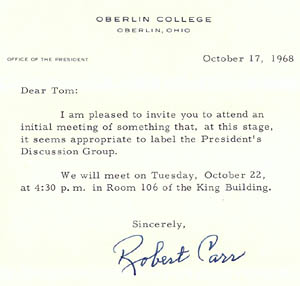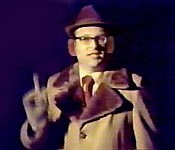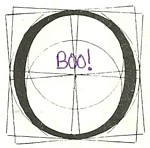|
|
|
Oct |
||||||||||||||
|
^ |
October 1968
Added to website
October 1, 2018
It was Saturday, October 5. Oberlin College's football team, having eked out a comeback win at Hiram the previous week — their first opening-game victory in seven years — now were playing at Carnegie-Mellon University in Pittsburgh. It was also our second broadcast of the season on WOBC.
Again we were coming down to an exciting finish. The game was tied 28-28 late in the fourth quarter. It might end that way; the NCAA would not institute overtime until 28 years later.
Oberlin had already used two of its time outs, but sophomore quarterback Dan Duffey was working the clock with “a brilliant display of running and passing” (according to Cary Seidman in the Oberlin Review). I recall at least one reception near the far sideline by tight end Pat Donlon, who had been in a German class with me when we were sophomores.
With the Yeomen driving from left to right on your radio dial, I was on a roll as I called the game. My analyst, Jeff Hanna, was sitting beside me. We shared a single hand-held stick microphone.
There had been a rule change for 1968: On a first down, the clock was stopped until the chains had been moved and the ball was marked ready for play. I had wondered how to describe that concisely, but it turned out to be no problem: “Only 32 seconds left in the game! The clock has stopped for the first down. Now it starts again!”
Oberlin reached the 10-yard line, and the running clock reached 10 seconds. Then Carnegie-Mellon's rattled defense surprised everyone by calling time out. My analyst held out his hand to ask for the mic.
Jeff speculated about what Coach Bill Grice could do. The Yeomen might throw a pass into the end zone, and if it fell incomplete they would still have time to try for a field goal. But Grice decided to play it safe. Jeff told our listeners that placekicker Steve Ashton had come on to attempt a 27-yarder.
|
As the play-by-play announcer, I expected to take back the mic and call the play that would decide the outcome. But now it was Jeff who was on a roll, and I let him keep on talking. Ashton's kick fell short and off to the right. The gun sounded, and the game ended in a tie. Nice going, Jeff. |
|
A Long Talk in the Conference Room
As a college senior, I was conflicted. Should I meet conventional expectations by pursuing a career in my undergraduate major, physics? Or did I want to continue having fun as a broadcaster? (The niche in which I would eventually find myself — operating a computer to display live graphics on TV sportscasts — was then in its earliest infancy.)
One evening, probably in October, I confessed to an increasing sense of depression. “I have almost zero interest in studying graduate physics, I'm getting behind in my problem sets, there are difficult WOBC decisions to be made, I have to force myself to work on the problem sets, etc.”
|
Jan Olson sent me a message, “sined” with a sine wave. I tried to talk to her at dinner (“a conversation with you is always a great morale- and ego-booster”). I needed her moral support (“not for specific help on specific matters, but just for some repeated assurance that you still think I'm a good guy regardless of all that Math 33A homework I don't have done yet”). |
|
But in my unconfident state I wasn't a good conversationalist (“someone else grabs you away when I stop to think”). One of her other friends was Bruce Babcock; as it turned out, she would marry him four years later. Finally Jan accompanied me as I walked to Wilder Hall and up to the third floor.
There's a seldom-used back room at WOBC Radio that in recent years has become a live performance space known as Studio B.

In my day we called it the Conference Room. Near the door sat a four-foot-high plywood cabinet that had once enclosed the station's teletype machine to muffle the sound. Over on the far side lay some discarded organ pipes.
On this occasion, as usual, no one was using the room, and here I was able to talk to Jan without interruptions. For a while she sat inside the cabinet. For a while she stood by the window, gazing out over the fire escape onto rainy Woodland Street, and I joined her there. She spoke partly in French, saying things that I took to mean “Poor, poor Tom.”
I tried to explain to her the next day (in the note I've been quoting above), “even though I had absolutely nothing to say to you, I just wanted you to spend a little time with me and thereby partly restore my confidence in myself. And that's what I was trying to say to you, although since nothing seemed to be going right yesterday it didn't come out very coherently at all. I'm sorry.”
|
“Still, if I were ever, like Emily in Our Town, permitted to relive one day of my checkered past, I would choose a beautiful October afternoon in Oberlin, when all the world was young.” (Michael Dirda, Class of 1970, in his 2015 book Browsings)
|
|
Later that month, Jan got out her scissors to make for me a “small token of friendship,” which was “in growing recognition and appreciation of much that is going on inside you.” You can click on the image to the left.
Giveaways and Double Negatives
|
|
My father's automobile dealership celebrated the annual autumn introduction of the next year's models by distributing imprinted promotional items, such as rubber balls and yardsticks. When the 1969 Chevy debuted, there was a Styrofoam airplane kit (below) including a Chevrolet wing and canard. |
|
The fuselage had the slogan “Putting you first keeps us first” and a little metal clip for adjusting the trim. I set one aside for a possible future whimsical gift. |
|
Later, as
nearly as I can reconstruct the nonsense, Jan asked what I wanted for
my 22nd birthday. I suggested she could give me a negative nail clipper.
“A what?” she asked.
“A
negative nail clipper. It's a personal grooming accessory.”
“But what makes it ‘negative’?”
“Well,
you know how the negative of minus-one is plus-one?”
“Uh, sure.”
“So a
negative nail clipper would logically be the opposite of a nail clipper.”
“I guess so....”
“But
how could you give me a negative nail clipper? Do you have one?”
“No.”
“So
how can we make this happen?”
“I don't know....”
“I've
got an idea. Suppose I gave you a positive
nail clipper.”
“Huh?”
“Wouldn't
that be equivalent to your giving me a negative
nail clipper?”
“I suppose....”
|
So I handed her something that looked like this. Yadhtrib yppah! She was nonplussed. |
|
Want the Good News First?
Turn-on news: The three-way 1968 presidential race was heating up. One day I got the emphasis wrong while reading the UPI headlines at the top of WOBC's News Roundup. (I wasn't yet aware of David Brinkley's recommendation: in your script, underline the words you want to stress. Here I'll underline the words I actually did stress.)
“In the campaign today,” I reported, “Hubert Humphrey seeks labor support. Richard Nixon addresses young Republicans. And George Wallace turns on hecklers.
“Uh, turns on hecklers.
“We'll have the details right after this.”
I looked
up, and behind the glass Randy Bongarten was laughing.
Brief news: One night I was assigned to read the five-minute news summary. However, because of reasons, the time slot had shrunk to two minutes. I decided to speakveryrapidly in order to pack as much news as possible into those 120 seconds.
Later, I
asked my engineer whether my fast talk had been understandable.
The answer: yes, except the part where I rattled off the sports scores.
|
Good news: It had been nearly two years since American astronauts had been in orbit, but Apollo 7 was set to launch on Friday, October 11. This would be NASA's first three-man flight and the first manned launch of a Saturn rocket. To watch the liftoff shortly after 10:00 that morning, I walked over to one of the new men's dorms, where there was a color TV in the lobby.
Bad news: Oberlin's 1-0-1 football team lost its home opener the next day to Baldwin-Wallace by the score of 68-0. (Illustration: 1964 Hi-O-Hi) |
|
|
Anthem Protest The following Wednesday, few students were watching the Olympics from Mexico City when the USA's Tommie Smith set a world record in the 200-meter finals. But we did hear about what happened next. At the medal ceremony, Smith and bronze medalist John Carlos each raised a gloved fist during the Star-Spangled Banner to represent black power in America. Four years later Smith would come to our campus. He joined the Oberlin College faculty as a track coach, assistant director of athletics, and sociology professor. We also hired a black football head coach. These startling, almost unprecedented moves would bring Howard Cosell to Oberlin in 1973. |
Homecoming 1968
Our next football game, on October 19, would be part of the homecoming weekend.
Jan wrote out a dining hall announcement on behalf of the Social Board. It promoted “Open Wilder” on Friday from 7:30 to midnight. There would be folk dancing and singing, poetry readings, three 1930s movies for only 25¢, and a Multi-Media Arts Environment on Wilder's second floor.
|
At Jan's invitation, I joined her for the postgame Homecoming Dinner on Saturday. The next day, I spent most of the afternoon working on physics problems before escorting her to the Judy Collins concert that night. In the Review Steve Mayer called Miss Collins “the leading interpreter of modern folk song” and “a giver of beautiful gifts; she picks the best of the songs she hears and gives them to you, as a sort of special bouquet. If nothing else, she deserves eternal gratitude for giving us Leonard Cohen and, with a slight assist from Tom Rush, Joni Mitchell.” |
|
|
|
Our radio station had often played Judy's recording of Joni's “Both Sides Now.” Her Finney Chapel performance included more than a dozen other tunes. I remarked that, for some reason, the one I happened to like best was “In My Life.” “But,” Jan pointed out, “that's just an old Beatles song.” “I know,” I replied, “but it's a good one.”
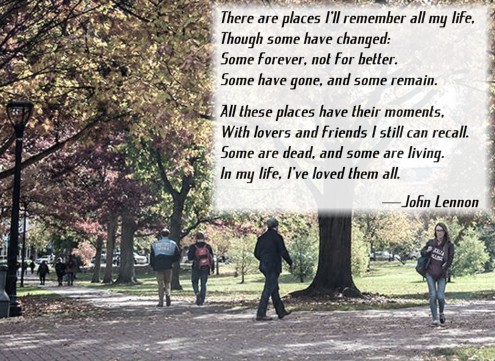
As it turned out, somewhat to my surprise, in 2001 a poll of songwriters chose “In My Life” as the greatest song ever written! Here it is.
And here's another tune from “Judy blue eyes.”
Discussion Time
The next day was Monday, October 21. I chaired a meeting of the WOBC Board of Trustees.
|
Then on Tuesday, I attended another gathering at the personal invitation of the president of the college. Ten Student Senators, 13 administrators, the editor of the Oberlin Review, and 23 other members of the college community had received the same summons. I was invited because I was the WOBC station director. |
|
Our first meeting didn't lead to anything, and I don't think there ever was a second meeting.
October Draws to a Close
|
|
As the weather turned chilly, I donned my winter coat with its furry lapels and added my new furry earmuffs. According to my notes, it was on Sunday, October 27, that Jan started calling me “Fuzzy.” |
|
|
And remember the disk of public service announcements I had given her in February? The novelty had finally worn off, so she gave the scary pesticide record back to me — for Halloween. |
|
COMING IN NOVEMBER: Non-Revolution is in the air, but someone frets about a possible skyjacking. We also have election returns, Kaddish, and Kijé. Click here to continue. |

